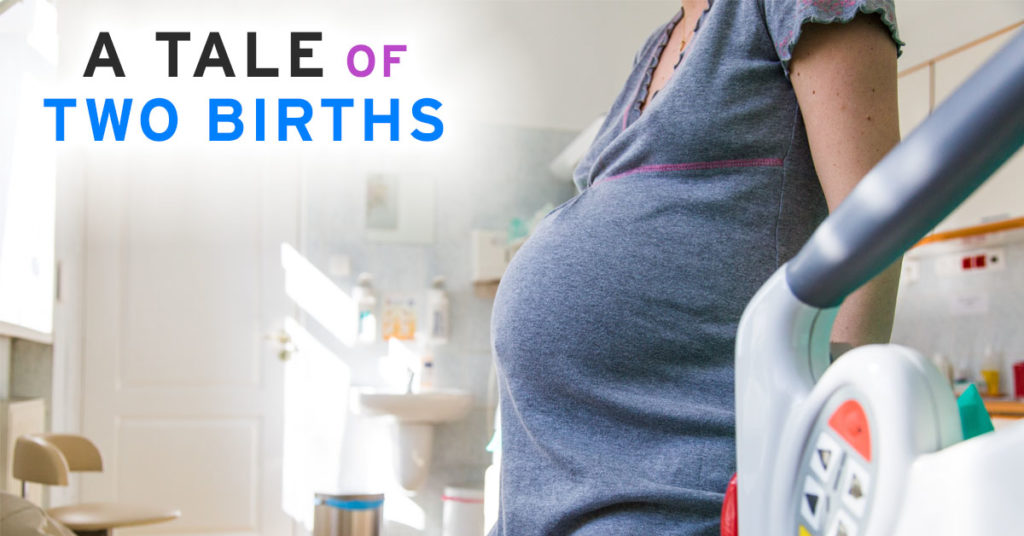A Tale of Two Births
Maternal Health and Wellness. It’s not a new topic or new rally cry – but like with so many things, 2020 brought it front and center and highlighted the injustices that can arise in delivery rooms.
Doulas are drawn to birth work to support those birthing. Our role is comfort, coaching, affirmation and education. We aim to protect the birth space, help usher in dignity and peace, and advocate for the wishes of our clients. We see the beauty in harmonious birth teams and the respect and honor this brings to birth. We also have a front row seat to the injustice, racial bias, and trauma that too often occurs.
Recently, I had a ticket for that front row seat. Back-to-back births exposed the injustices of birth. It was raw, hard and wrong. The treatment of the two mothers differed as far as the East is from the West.
Amy and her partner are both biracial and Spanish speaking, choosing to birth at the closest hospital located one town over. It’s a diverse population, and on the scale of incomes it leans toward middle-lower class. Sara and her partner are both white and English speaking, and they chose to birth at one of the more dominant birthing hospitals in a predominantly white, middle-upper class town.
Amy’s labor started like most, her water broke in the morning and she made her way to the hospital. Immediately she was met with opposition and demands to induce, use medication, and faced scare tactics on infection and risk. Amy knew she had time, and called me in. The entire day was an uphill battle, fighting assumptions on education, opinions and interventions. It’s a story for another time. As we faced a cesarean birth – the treatment was sickening. It was not an emergency. There was time, yet there was no patient care or communication. The team didn’t take the time to brief Amy on what was going to happen, the blame was put on her in a passive-aggressive way by the nurses, and she was being wheeled away for major surgery without one kind word of encouragement.
We stopped them. We asked questions so Amy and her partner knew what was to come. Short. Brief. Annoyance. That is what we received. Wishes weren't honored. Questions weren't answered. As the procedure ended, the nurse came back into the room with the baby alone, the father followed a few minutes later. I had to ask the nurse to wait for him before weighing the baby and measuring him – she looked at me as if the request was crazy. Despite our requests to keep them together, Amy was separated from her baby for no medical reason except convenience to the staff. It was heartbreaking.
24 hours later and 10 miles away – Sara’s water broke. Like Amy, she made her way to the hospital. Her welcome was quite different. The nurse beamed and exclaimed how it was a great day to have a baby. The demeanor and bedside manner is what any expecting person would desire. As the surgeon approached to walk us through a c-section, I prepared to advocate and ask questions. His approach, respect, and consideration for my client’s wishes was a stark difference to what I had experienced the day prior. Each step was explained, each question answered with patience. As I waited for them in recovery, my mind kept comparing and contrasting. They all arrived in recovery as a family unit. Baby on mom’s chest. Skin to skin. Honor for her desires, respect for her body and her baby.
As I walked out of the hospital that night, my mind was exhausted and my heart tired. What I witnessed is what I’ve read about – maternal injustice. Two moms, two babies, two very different birth experiences. There is no way to ignore the differences or the injustices that I witnessed. Maybe a few years ago I would sweep them under the rug and chalk it up to different staff or doctors, but given all of the research, testimonials and an unearthing of systemic racism over the past few years in the maternal wellness space – you have to call it for what it is. The unconscious bias surrounding BIPOC births was blatant. Amy was given subpar care, fewer options, and shorter responses for no other reasons than the color of her skin and a broken system.
Amy and I have debriefed, and she is aware that the treatment she received was inferior. She has advocated for herself, written letters to the Director of Patient Care, and worked through it with her own therapist. None of that makes it right. Birthing people of all shapes, sizes and colors should be given the same standard of care. Their wishes, desires, hopes and dreams should be equally cared for, no matter where they decide to give birth. Zip codes should not dictate what is available to birthing people.
So what can we do with this? We don’t all have the opportunity to stand beside birthing people in delivery rooms or educate them as they approach these decisions, but you can do the work. You can educate yourself on the rights of birthing people, face your own biases head on, read, listen, and encourage those around you to rally behind causes that help fight for equality.
This was a guest blog post by Rophe Mason, who owns
@edenbirthservicesma.


